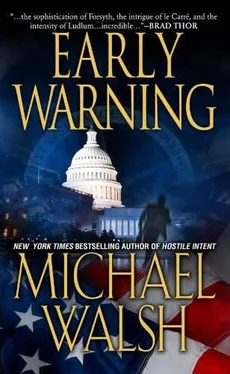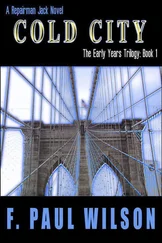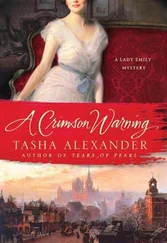Michael Walsh - Early Warning
Здесь есть возможность читать онлайн «Michael Walsh - Early Warning» весь текст электронной книги совершенно бесплатно (целиком полную версию без сокращений). В некоторых случаях можно слушать аудио, скачать через торрент в формате fb2 и присутствует краткое содержание. Жанр: Триллер, на английском языке. Описание произведения, (предисловие) а так же отзывы посетителей доступны на портале библиотеки ЛибКат.
- Название:Early Warning
- Автор:
- Жанр:
- Год:неизвестен
- ISBN:нет данных
- Рейтинг книги:3 / 5. Голосов: 1
-
Избранное:Добавить в избранное
- Отзывы:
-
Ваша оценка:
- 60
- 1
- 2
- 3
- 4
- 5
Early Warning: краткое содержание, описание и аннотация
Предлагаем к чтению аннотацию, описание, краткое содержание или предисловие (зависит от того, что написал сам автор книги «Early Warning»). Если вы не нашли необходимую информацию о книге — напишите в комментариях, мы постараемся отыскать её.
Early Warning — читать онлайн бесплатно полную книгу (весь текст) целиком
Ниже представлен текст книги, разбитый по страницам. Система сохранения места последней прочитанной страницы, позволяет с удобством читать онлайн бесплатно книгу «Early Warning», без необходимости каждый раз заново искать на чём Вы остановились. Поставьте закладку, и сможете в любой момент перейти на страницу, на которой закончили чтение.
Интервал:
Закладка:
CHAPTER TWENTY-FOUR
Dresden, Germany, February 1945
As Emanuel Skorzeny awoke one morning from unquiet dreams, he found himself, in his bed, transformed into a monstrous thing, unworthy of sacrifice but doomed nonetheless.
For a moment, he wasn’t quite sure where he was. Since July of last year, most of the beds he slept in were new to him, most of the houses unfamiliar. His life had been a series of courtrooms and judges, of soldiers and wardens, of prison cells. To find himself here, in Dresden, one of the most beautiful cities of the Reich, was like a dream. And yet he was having a nightmare.
The Elbe, the mighty river, was not far away, and perhaps in the summertime he might be able to smell it, but this was winter in Saxony, one of the coldest parts of Germany, and there was nothing to smell except his own breath before it froze upon exhalation. He dreaded getting out of bed, into the frigid morning air, the hot brick from the fire long since having cooled so that now he was snuggled up against something cold and unfeeling and indifferent. It was a feeling he would clutch to his breast for the rest of his life.
He fought for consciousness, trying to shake off the effects of the dream. But it stayed with him, and even though he knew it was inspired by Kafka, in a short story that he should not have been reading, in a place he should not have been reading it, he still found it hard to discriminate between fantasy and reality. His whole world, once so secure, was now one horrible, grotesque fantasy.
His father, his new father, stood in the doorway of the small attic room, looking at him with a mixture of obligation, fear, and disgust. “Get up, Kurt,” he said. “Today, we seek the enemies of the people. Of the Volk.”
Skorzeny arose and performed his ablutions as best he could. The chamber pot went back under the bed; the water with which he washed himself was practically frozen. He dressed and went downstairs, his hair plastered and stuck to the sides of his head like small brown icicles. He didn’t mind being called Kurt, even though that was not his real name. When they let him go, released him from the Sippenhaft burden and resettled him and some of the others in new families scattered across the Reich, they had told him to forget his real name as quickly as he could, never to mention it again upon pain of death, to adapt and change and molt to his new circumstances until he became not only a man-which was fast approaching-but a new kind of man.
He would take a new name when the time came. A name that would signify something. For now, though, he would answer to whatever name they gave him, and execute whatever task they assigned to him. They had spared him, after all. Which is more than he would do to them or anyone like them when he got older, and at the first possible opportunity. This he had sworn to himself on that day in front of Freisler in the Volksgericht, the day his real father was condemned to death…
“What have they done, Papa?” asked the boy. He was still young, not yet a teenager, but already was treated as the future man of the house. After all, although he was Sippenhaft, he was also one of the future leaders, accepted into the Adolf-Hitler-Schule, the school for the best and the brightest Germany had to offer. He would show them. He would show them what a terrible mistake they had been to accuse his real father, and what an even more terrible mistake they had made to antagonize the son.
“Nothing yet,” replied his new father. “That is for us to discover.”
Emanuel Skorzeny respected his new father for one simple reason: he had survived. That was good enough for him. After all, families came and went but allegiances were transferable.
Unternehmen Eiche, whispered his father, and he knew what that meant. Every good German youth knew what that meant: Operation Oak. The rescue of comrade Mussolini from the red partisans and the revanchist forces of the King from the mountaintop hotel, Campo Imperatore, where il Duce was being held.
“And what did I say to il Duce?” his father asked. In just short time together, it already become a ritual with them. He liked rituals.
“Duce, the Führer has sent me to set you free!”
“To which il Duce replied?”
He only had to think for a moment: “I knew that my friend would not forsake me!”
His father smiled. They were out of the house, crossing the Elbe now. At times, Emanuel wondered why his father no longer resembled the photographs he had seen of him in his Waffen SS uniform, although from time to time he still wore the Iron Cross. After all, he was the man who had almost captured the NKVD headquarters in Moscow, before den zweiten Dolchstuss-the second stab in the back.
For Germany was finished, that he knew, even at his young age. Germany had given to him and Germany had taken away-the way of the world, for which he bore the country no ill will. This was war, and in war people did strange things, fought for strange goals, shifted alliances and allegiances, with only one purpose in mind-to survive. Whatever his father had done, whatever his stepfather had done, and whatever he would do in the future, would be as a consequence of this war. There was nothing he could do about it, and there were no tears he would shed over it. Let the dead bury the dead and the living go on, to extract their terrible revenge on the corpses of both friend and foe as best they could.
Vater Otto moved swiftly down the street. He knew exactly where he was going. And when they came to the door of No. 17 Marschnerstrasse, he didn’t wait for an answer to his knock, but instead as it half-opened, he kicked it in with one massive blow from his boot.
They caught the family unawares, still groping toward the fire for warmth, helpless when they should have been wary. Otto said nothing but walked smartly to the hearth, which had not yet begun to smolder, and brushed aside the embers. Then with one mighty wrench he pulled open the grate, the false grate, to reveal below a whole hidden room. “Juden, raus,” he barked.
And one by one they came up, with Otto lending a hand to haul them into the kitchen. One, two, three, four of them, a father and a mother and two children, the oldest not much older than himself, a boy and girl, standing there blinking in the light in the nightclothes, half-frozen and all dead.
That there were still Jews in Germany was an open secret. Despite the Kristallnacht and the Nuremberg Laws, despite the emigration of as many of the country’s half a million or so Jews to Britain and America and elsewhere, there were still Jews in the Reich, living hidden among the people, some protected by powerful men, as in the Bavarian countryside, some more or less living openly, as in Berlin, the capital city that had never taken to Hitler and his uncouth Bavarian and Austrian interlopers. But Dresden was still a small town, for all its accomplishment in music, porcelain, and the arts, and the few still here had been eking out a living as craftsmen and black-marketeers, while plotting their escape up the great river on one of the ships that still plied the waters, despite the Allied bombing.
“Enumerate,” said Vater Otto, and Emanuel knew what that meant. He gestured to the children, to the boy and the girl in their flannels, and without compunction asked them to turn over to him whatever fungible possessions they had. Even at this point in the war, when the sound of the British and the American planes overhead daily and nightly was an everyday occurrence, there was still business to conduct, and scores to settle.
The boy was about 15, the girl about 12. “Wie heisst du?” Emanuel asked them each in turn, and they replied: Heinrich and Eva. Good German names both, but there was no time for that now. He took their gold and their timepieces and their diamonds, because for some reason it was less humiliating for them to hand over the last things of value they had in the world to a boy rather than to a man. He could see by the looks on their faces that they knew they were done for, that no matter what the lies of the Reich about the mercy of Adolf Hitler, about the model camps at Theresienstadt, that somehow the word had filtered back, as it always does, to torment its future victims with fear as they struggled against the inevitable.
Читать дальшеИнтервал:
Закладка:
Похожие книги на «Early Warning»
Представляем Вашему вниманию похожие книги на «Early Warning» списком для выбора. Мы отобрали схожую по названию и смыслу литературу в надежде предоставить читателям больше вариантов отыскать новые, интересные, ещё непрочитанные произведения.
Обсуждение, отзывы о книге «Early Warning» и просто собственные мнения читателей. Оставьте ваши комментарии, напишите, что Вы думаете о произведении, его смысле или главных героях. Укажите что конкретно понравилось, а что нет, и почему Вы так считаете.












